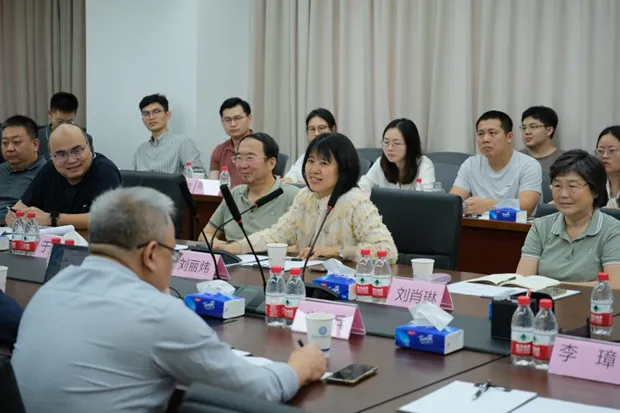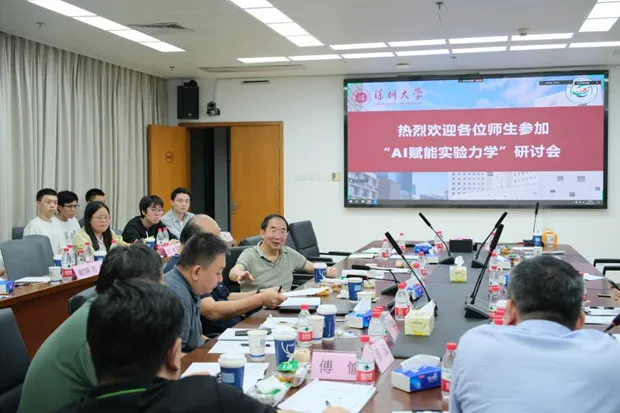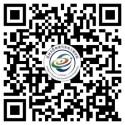AI has become an indispensable tool in today’s scientific research and engineering applications, which not only greatly expands the boundaries of human cognition, but also provides unprecedented solutions for solving complex problems, and has become an indispensable tool in present scientific research and engineering applications, and even formed a new “scientific research paradigm”.
In order to further implement President Xi Jinping’s important exposition on the development of the new quality of productive forces and the spirit of the Third Plenary Session of the 20th CPC Central Committee, and strive to promote the in-depth integration of artificial intelligence and experimental mechanics, and to promote the technological innovation in the field of experimental mechanics, under the suggestion of Academician Yu Qifeng, the College of Physics and Optoelectronic Engineering, Shenzhen University, in cooperation with Shenzhen Intelligent Optical Measurement and Perception Laboratory, organized a symposium on “AI Enabling Experimental Mechanics” seminar.

The meeting was held in the conference room of the College of Physics and Optoelectronic Engineering on November 18, and invited more than 30 experts and scholars from famous universities in China, such as Prof. Miao Hong from the University of Science and Technology of China, Prof. Wang Hongdong and Prof. Ma Shaopeng from the Shanghai Jiaotong University, Prof. Qiu Wei from the Tianjin University, Prof. Liu Yiping from the South China University of Technology, Prof. Zhang Xiaohu from Sun Yat-Sen University, Prof. Zuo Chao from the Nanjing University of Science and Technology, Prof. Zhu Qibing from the Jiangnan University, and Prof. Li Zhang from the University of National Defense Science and Technology. More than thirty experts and scholars from universities attended the meeting. Liu Liwei, Executive Vice Dean of the College of Physics and Optoelectronic Engineering, Shenzhen University, gave a welcome speech, in which she introduced the development history of the college, scientific research and talent training achievements and pointed out that: “Artificial Intelligence, as a hotspot of the world’s science and technology, has a revolutionary significance in the field of measurement, and we hope that the experts at the meeting will discuss together to promote the in-depth fusion of Artificial Intelligence and Experimental Mechanics, and to expand the application of Experimental Mechanics”. Subsequently, scholars from Shanghai Jiaotong University and other seven universities made presentations on “AI and Experimental Mechanics”, “High-speed 3D Imaging and Measurement: From Classical Stripe Projection to Deep Learning Methods”, “Deep Learning Methods of Digital Image Correlation”, “Deep Learning Methods of Ships”, and “Deep Learning Methods of Ships”. ”, “Real-Time Wavefront Reconstruction Method for Fusion of Real and Virtual Optical Data under Ship Maneuvering Motion”, “Data-Driven Position Measurement of Non-Cooperative Targets”, “AI-Based Long-Term Structural Health Monitoring Technology”, and “AI and Experimental Mechanics”. The presentations include “Data-driven Position Measurement of Non-cooperative Targets”, “AI-based Long-term Structural Health Monitoring” and “Automatic Discovery of Physical Laws from Data”. After that, all the participants discussed the new opportunities and directions of experimental mechanics in AI era.

Finally, Academician Yu Qifeng made a concluding speech. He emphasized that experimental mechanics is still facing a lot of difficulties and challenges in response to national major engineering needs, such as how to deduce the internal damage through the external deformation information of the structure, how to find the deep mechanical laws through a large amount of experimental data, AI should be able to provide new ideas for this solution, which is worthy of experimental mechanics colleagues to pay great attention to and in-depth exploration. He suggested that we should promote the work related to AI-enabled experimental mechanics by organizing thematic seminars, planning a special issue of Experimental Mechanics and other forms.

This seminar is not only a useful practice for our institute to implement the national development strategy of new quality productivity leadership, but also a milestone of the strategy of AI-enabled experimental mechanics, which injects a strong impetus for the innovation and development of experimental mechanics in the context of the new era, and will vigorously push forward the in-depth fusion of AI and experimental mechanics, and enhance the ability of experimental mechanics to solve the major engineering problems of the country.


![]() Add : No. 3688, Nanhai Avenue, Nanshan District, Shenzhen, Guangdong Province
Add : No. 3688, Nanhai Avenue, Nanshan District, Shenzhen, Guangdong Province ![]() Email : cpoe@szu.edu.cn
Email : cpoe@szu.edu.cn ![]() Phone: 0755-26538735
Phone: 0755-26538735 ![]() Fax : 0755-26538735
Fax : 0755-26538735